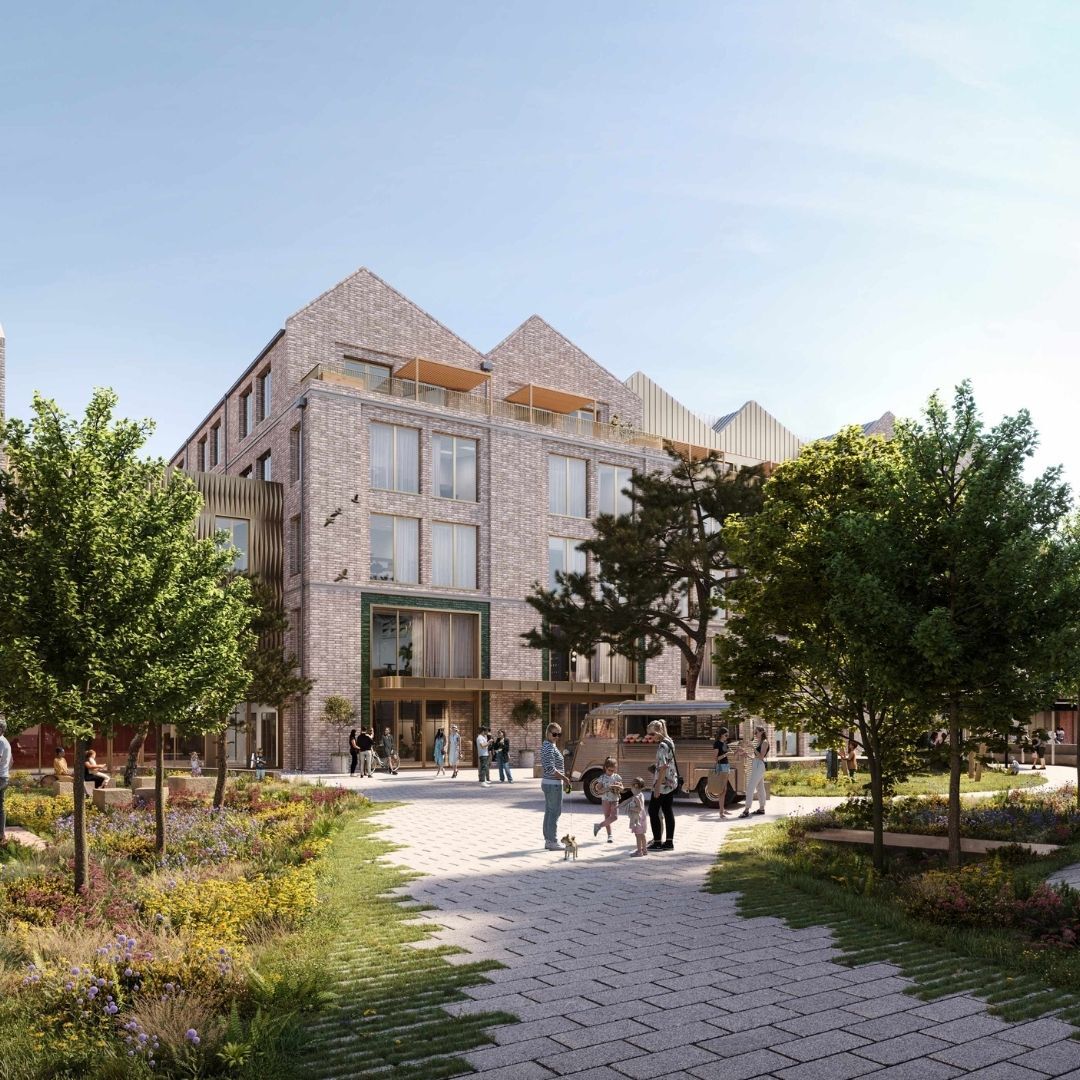Get updates from The Developer straight to your inbox Yes, please!
Devonshire Gardens, Cambridge, for Railpen and Socius, with RH Partnership and LDA Design

Three buildings, set in a new public park, will constitute the Devonshire Gardens project. Seventy build-to-rent homes are designed to meet the city’s net-zero carbon ambitions and operate with no reliance on fossil fuels. Additionally, 11,000sqm of workspace will be developed. With the goal of exceeding conventional environmental standards, Devonshire Garden will incorporate 617 cycle spaces, rain gardens and pollinator habitats.
Who is on the project team? (designer, consultants, etc)
RH Partnership - lead architect.
LDA Design – landscape architect
BSG Ecology – ecologist
Bidwells – Planning consultant
Gardiner & Theobald – cost consultant
Bioregional – sustainability consultant
Please describe your approach to this future public realm. How does it knit into, and serve the needs of the wider area?
Garden for all: At the heart of the public realm is a ‘garden for all’, a central lush courtyard that is enclosed and wrapped in woodland, creating a much needed new publicly accessible green space for the whole community. There are routes from the woodland with paths continuing to meander through planting with a sheltered pavilion at the heart of the garden.
Sustainable Food Growing: Food growing and foraging spaces are incorporated alongside the Play Street and the residential roof terrace – with herbs, vegetables and fruit. All sustainably irrigated, using rainwater harvesting and fertilised using composters to re-use food waste. Cambridge Sustainable Food, will manage the spaces and curate a calendar of events/activities for the local community, including schools. The planning application was the first to adopt a Statement of Intent for Sustainable Food.
Play Street: Doorstep play is incorporated throughout the public realm providing adventurous short cuts through planting areas for people of all ages. A dedicated play street will be located outside the creche, providing a safe, colourful and interactive space, where parents and guardians can gather. Local primary school children are sharing their views and desires around play and outdoor activities.
Community Pavilion: The pavilion will provide a centrepiece and bring people closer to nature. A community focused space that gives back to the whole local community for events, activities, such as the Mill Road Winter Fair, and informal gatherings. A competition to determine the final design will be launched imminently, aimed at encouraging local designers.
Describe the social impact of the project: How will it contribute to the economic, environmental and social wellbeing of the wider place and its community?
At the heart of the community: Devonshire Gardens will be a new sustainable development: - That will include a central green space got the surrounding community - Is genuinely mixed use, providing a new diverse community with residential and commercial opportunities - Connects to the spirit of Mill Road, extending its legacy - Provides high quality architecture, contributing to wellbeing - Provide exemplar cycle parking and end of journey facilities - Opens up an inward looking site, improving connectivity - Reinvigorates a brownfield site. Edible planting and sustainable food: The vision is to create a place to grow, share, eat and learn about food within the public realm of Devonshire Gardens, Cambridge Flora and Cambridge Sustainable Food, will help design and manage these spaces. - 2 blue roofs with rainwater harvesting for sustainable irrigation - 6 proposed edible trees planted with species including Crab Apple ‘Everest’ - Providing educational opportunities and social activities for all - 30 raised vegetable patches and herb gardens - Providing food for local wildlife - Local food waste collection & on-site composters for organic fertiliser Connectivity & Interaction: Devonshire Gardens public realm will provide moments to connect and interact, creating a sense of community: - Tech-enabled, flexible rooms to rent on an hourly basis - Creche/children’s nursery - Cycle hub - Communal kitchen & Deli - Creative space / workshop / artists’ studios - Bakery / café Social Value: Over £246.2m of social value could be generated over 20 years – details attached.
What is the sustainability strategy for the project? How will the carbon use and material impact of the development be mitigated?
A One Planet Living Neighbourhood: Designed with Bioregional following One Planet Living *principles, the plans deliver the following, to name a few: o BREEAM Outstanding office buildings o NABERS accredited to reduce energy use and optimise real-world energy use o Designed for net zero carbon and fossil-fuel free operation o Using Natural Cambridgeshire’s Developing with Nature toolkit to enhance and validate the increase in biodiversity - Largely car-free development with 617 secure cycle spaces, including 30 accessible/ cargo bike spaces and seamless integration with the Chisholm Trail. Only car parking available will be for disabled users, car clubs, visitors and loading, with EV charging. - Extensive green roofs - Extensive photovoltaic solar panels for on-site, zero carbon, renewable energy - *Please see supporting materials Raingardens, sustainable drainage systems, careful material choices and ecological enhancements contribute to the high level of sustainability and biodiversity across the landscape and roofscapes. Benefits of the proposed trees: - Increase biodiversity & species variation - Create more habitats and food for birds and animals - Create seasonal interest, colours, flowers - Introduce various shapes, forms, and textures - Provide shade and reduce the urban heat island effect - Provide edible fruit. Insect hotels & pollinating plants: - 13 rain garden beds with wildflowers - Bat boxes - 5 green roofs - 2 hedgehog habitats - 10 bird boxes for species such as swifts and starlings - 4 grass lawns - 11 ornamental planting beds - 11 evergreen planters
Sign up to our newsletter
Get updates from The Developer straight to your inbox
Thanks to our organisation members
© Festival of Place - Tweak Ltd., 124 City Road, London, EC1V 2NX. Tel: 020 3326 7238